Escape from Shadow Island Read online
Page 9
“No, I’m fine,” Max said.
“What’re you doing down here?”
“Just exploring.”
“It’s like a maze, isn’t it? Nothing seems to go in a straight line.”
“And you?” Max asked. “Where are you going?”
“Me? Well…” Pratchett seemed flustered. He had to think for a moment. “I’ve got a meeting. I’m looking for the Calle Something-or-other. These Spanish street names are so hard to remember, aren’t they? I know it’s around here somewhere. Must go. See you about.”
Pratchett scurried away, but Max stayed where he was for a few minutes. Had that encounter been an accident? Or had Pratchett been following him? Max was on his guard now. As he descended the next flight of steps, he looked back continually, but he saw no sign of the salesman.
Nor did he notice the small, inconspicuous man in a white shirt who gave him a moment to turn the corner before coming down the steps behind him.
Max stayed vigilant when he reached the harbor, pausing to look around carefully before he went in search of Fernando Gonzales. There were two sections to the harbor—the older, smaller part that had a stone quay with local fishing boats moored alongside it, and a newer, larger part that was the marina for the yachts and cabin cruisers of Santo Domingo’s wealthy visitors.
Max walked past the marina. The boats tied to the wooden jetties were uniformly large and luxurious, but they were nothing compared to those moored farther out in the river. Those vessels were like mini–cruise ships—sleek and streamlined, with berths for a dozen or more people. Their owners were sitting on deck beneath striped awnings, eating lunches prepared by their on-board chefs and served by uniformed waiters. Max could hear the faint clink of cutlery, the tinkle of champagne glasses, and laughter drifting across the estuary.
At the mouth of the river, in the wide channel between the mainland and Shadow Island, the largest, most impressive boat of all was anchored. It must have been at least twice the size of its nearest rival—two hundred fifty feet or more, with portholes along the sides and a helipad and helicopter on the stern deck.
Beside these floating palaces, the boats belonging to the local fishermen looked scruffy and forlorn. Actually, most of them were scruffy and forlorn. Their wooden hulls were scratched and patched with tar, their cabins faded and weathered by the sun and the salt. One or two looked so old and fragile, it was a wonder they were still floating, never mind being used for fishing in the fierce waters off the Santo Domingo coast.
A gnarled-looking fisherman in a dirty shirt and oily jeans was repairing a net on the quayside, his face shaded from the sun by a wide-brimmed hat. Max went up to him and said politely, “¿Habla inglés?”
The fisherman looked up. His skin had the color and texture of old leather. “English? A little,” he said.
“I’m looking for a man named Fernando Gonzales. He has a boat.”
The fisherman frowned, his whole face wrinkling. “Fernando? He no here. He dead.”
“He’s dead?” Max said. “When did he die?”
The fisherman shook his head vaguely. “One, two year ago.” He bent over his work, his fingers expertly sewing up a tear in his net.
“Did he have any family?” Max asked.
“Yes, family.”
“Do you know where they live?”
The fisherman gestured up the hill. “That way. Calle San Miguel. Number three.”
Max thanked him and walked away, heading for the steps up the hill.
He was out of sight of the harbor, behind a row of houses, when the small man in the white shirt crossed the quay, flashed his police badge at the fisherman, and started questioning him.
Calle San Miguel was in the lower part of the Old Town, just above the harbor. There were no grand colonial houses here, no open squares. The buildings were shabby and rundown, packed closely together around dark courtyards. Signs of poverty and neglect were everywhere—broken shutters, boarded-up windows, missing tiles on roofs, children in ragged clothes playing games in the narrow, litter-strewn streets.
Max took a while to find number three. He went through a brick archway into a courtyard enclosed by tall, dilapidated apartment blocks. Above him was a spider’s web of washing lines strung between balconies, the dangling clothes almost blotting out the sky. An elderly woman dressed entirely in black was sitting out by her door, chewing on a crust of bread.
“Gonzales?” Max said to her.
The woman jabbed a finger into the air. “Segundo piso.”
Segundo? Max thought. That meant “second.” Segundo piso had to mean “second floor.” He thanked the old lady and went up the open staircase to the next floor. He knocked on a door and waited.
The woman who answered was thin and scrawny, her face lined and careworn.
“Señora Gonzales?” Max said.
“Sí.”
“Do you speak English?”
“¿Qué?”
“English. I’m sorry, I don’t speak much Spanish.”
The woman turned her head and called out a name: “Isabella!”
A girl about the same age as Max appeared in the hallway. She was tall and lithe in her jeans and T-shirt, her long black hair tied back in a ponytail. The woman said something to her in Spanish and she came to the door.
“I speak some English,” she said. “What do you want?”
“To ask you a few questions,” Max said.
The girl eyed him warily. “Questions about what? Who are you?”
“My name’s Max Cassidy.”
“Cassidy?”
Isabella seemed to recognize the name. She licked her lips and peered over Max’s shoulder, checking the staircase behind him. “Like the one who disappear?” she said.
“That’s right. Alexander Cassidy. He’s my dad. Your father took him out fishing in his boat.”
“Why you come here?” Her eyes flicked over his shoulder again.
“Can I come in?” Max said.
“What for?”
“I’m trying to find out what happened to him. I won’t stay long. Please. Just a couple of minutes.”
Isabella studied his face.
Max smiled at her. “I’ve come all the way from England.”
She hesitated. “You are alone?”
“Yes.”
“Not here. We go for walk.”
Isabella said something to her mother and stepped out of the apartment, closing the door behind her. Max followed her down the stairs and back through the courtyard to the street. Isabella paused, looking around cautiously. Max could see she was on edge.
“What’s the matter?”
“This way.”
She led him along the street and through the remains of a doorway into a ruined building. They clambered over the mounds of rubble and sat on the stump of a brick wall. Max noticed that Isabella’s jeans and T-shirt were faded and threadbare, and there were holes in the toes of her cheap sneakers.
“You remember my father?” Max asked.
“Everyone remember. Was in all the papers. Was big news. Famous Englishman disappear, police say wife kill him.”
“My mother didn’t kill him.”
“No? But she…There was, what you call it? In courtroom.”
“She was put on trial, yes,” Max said. “And convicted. But she didn’t kill him.”
“Why you come to us?” Isabella asked. “We know nothing about it.”
“I’m just curious. My dad wasn’t interested in fishing. Why would he get your father to take him out?”
“My father take lot of tourists in his boat. Not all like fishing. Some just want trip on boat.”
“My dad didn’t like boats either. Did your father ever say anything to you about him?”
Isabella glanced nervously over her shoulder, looking back toward the street.
“Are you scared of something?” Max said.
“This not good thing to talk about. The police, they question my father after yours disappear.
They question us too—my mother, my brothers and sisters and me—after Papa died. We no want trouble from police.”
“I’m not here to make trouble. Do you know where they went that day?”
“Out to sea. That all I know.”
“When did your father die?”
“Two years ago. June.”
“June? The same month as my dad?”
“Yes. Was not long after.”
She looked down. Max sensed that this was still a very painful subject for her.
“I’m sorry. Do you mind if I ask how he died?”
“He drown. He go out in boat and fall into sea. Another fisherman find his boat up the coast, no one on board.”
“Was his body found?”
“Yes, it wash up on beach.”
Max nodded sympathetically. Isabella turned her head away, but not before he saw the gleam of moisture in her eyes.
“That must have been hard for you,” he said. “How many brothers and sisters do you have?”
“There are five of us. Six with my mother. She work at night, as cleaner for offices in Rio Verde, but pay is not good. Without my father, it is hard. We try to sell his boat, but no one want. Boat is old, need a lot of work. And no one want to go fishing now. Is too hard, too dangerous. Young people, they all want job at Playa d’Oro. Is easier there, even if the pay is no better.”
They were silent for a time. From where they were sitting, there was a clear view over the estuary toward Shadow Island. Waves broke over the rocks on the shore, and up on the battlements of the fortress a figure paced up and down like a guard on sentry duty.
“Did your father ever take tourists out there, to Shadow Island?” Max asked.
“Isla de Sombra? No,” Isabella said. “You can’t go there. Is private. They have a boat. You go near, men on boat tell you to go away.”
“Really?”
“You get too close, they—I don’t know how you say. They do this.” Isabella held up her left hand, the fingers extended, and smashed her right fist hard into the palm.
“They ram you?” Max said.
“Yes, ram you. It happen once to my father. He get crack in boat, have to come back to harbor and mend it.”
“That’s pretty nasty. How can they get away with that kind of thing?”
“Man who own island, he is very rich, one of richest men in world. And very powerful. He do whatever he like.”
“What’s his name?”
“Señor Clark. Julius Clark. That’s his boat out there. The big one with the helicopter.”
“And Isla de Sombra is his holiday home?”
“I don’t know what he do there. Not holiday. There other people on island. They work there.”
“Doing what?”
“I don’t know. They come into Rio Verde sometimes. Go to shops, to bar.”
“Your father’s death…,” Max said. “It was an accident?”
“That what police say. What else could it be?”
Max didn’t reply. He was watching the figure on the battlements. More than ever now, it looked like a soldier on guard duty. The island seemed a strange place. A guard on the fortress, a boat patrolling the sea around it to keep people away…Max knew rich people liked to protect their privacy, but ramming boats that came too near seemed a bit extreme.
“Thanks for your help,” he said.
“That all you want to know?”
“Yes.”
Isabella turned to look at him. Her dark eyes were serious, her forehead wrinkling as if she were puzzled. “Why you ask me if my father’s death was accident?”
“I have the feeling nothing is what it seems here,” Max said.
It was late afternoon when Max returned to the Hotel San Rafael. He went upstairs to his room and splashed cold water on his face to cool himself down. Then he went next door to Consuela’s room. She must still be having her siesta.
Max knocked on the door. He heard footsteps inside the room. The handle turned and the door swung open.
A woman peered out at him. But it wasn’t Consuela.
She was older, a plump woman in her forties or fifties, with fat legs showing beneath her dress and grayish hair that had the texture of wire wool. “¿Sí?” she said.
Max stared at her. He’d never seen her before in his life. Maybe he’d somehow got the wrong room. But no, there was the number on the door. Max was in room four, Consuela in room five. So who was this woman? A cleaner, perhaps? Or another member of the hotel staff? That must be it. She was a hotel employee sent up to Consuela’s room for some reason.
“Is Consuela here?” he asked.
“¿Qué?”
“Señorita Navarra.”
“Who?” the woman said, speaking English now.
“Consuela Navarra. This is her room,” Max said.
The woman shook her head. “No, this is my room.”
Max craned his neck to see over the woman’s shoulder. There was a single bed in the room, a bedside cabinet, and an old wooden wardrobe. But no Consuela.
“When did you arrive?” he asked.
“Arrive?” the woman repeated. “Today. This afternoon.”
“Okay. I’m sorry to bother you.”
Max walked away, frowning. Consuela must have moved rooms while he was out. It was odd that she hadn’t left a note to let him know. He went downstairs to the foyer. There was a young woman Max hadn’t seen before behind the reception desk. He asked her which room Consuela was in. She checked the register and gave Max a blank look.
“What was the name again?”
“Consuela Navarra,” Max said.
“I’m sorry, but there is no Consuela Navarra staying in the hotel.”
“There must be. Could you check again, please?”
The receptionist inspected the register once more. “Navarra?” she said.
“That’s right.”
“No. No Navarra.”
“That’s impossible,” said Max. “She was in room five.”
“Room five is occupied by a Señora Córdoba.”
“But she’s only just arrived. Before that it was Consuela’s room. She checked in with me yesterday evening.”
“Room five was not occupied last night.”
“Of course it was. There must be a mistake in the register. We arrived together. What room is she in now?”
“I already tell you, señor,” the receptionist said. “There is no Señorita Navarra in this hotel.”
Max stared at her. What was going on? Was it a simple mix-up, a language problem? Did this woman not understand what he was saying?
“Can I see the register?” he asked.
The receptionist shrugged and turned the book round. Max studied the list of entries. There was his name—Max Cassidy—with his passport number, nationality, and room number next to it. But there was no mention of Consuela. The woman had been correct. According to the register, room five had been unoccupied the previous night.
Max felt a sudden flutter of anxiety in his stomach. Something wasn’t right here. Why wasn’t Consuela in the register? There had to be an explanation. Maybe someone had simply forgotten to write her name in the book. But that didn’t make sense either. Max had seen her name being recorded when they arrived. He’d been standing next to Consuela when she’d handed her passport to the receptionist; he’d watched the woman write her name, and then his, in the book.
“Could I speak to the manager, please?” demanded Max.
“The manager?”
“Yes. Now.”
The receptionist shrugged again and went through a door into an office at the back of the foyer. Max saw her talking to a man seated behind a desk. The man glanced sideways at Max through the door, then came out to the reception desk.
“You have a problem?” he said bluntly. He was a short, shifty-looking man with small eyes.
“Yes, I have a problem,” Max replied. “I arrived yesterday evening with a woman—Consuela Navarra. She spent last night in room five,
but she’s not there now. Another woman is in the room, and your receptionist tells me you have no record of Consuela ever being here.”
The manager pulled the register across the desk and examined it closely. “You are Señor Cassidy, no?”
“Yes.”
“You must be mistaken, Señor Cassidy. We have no Señorita Navarra staying here.”
“But that’s ridiculous,” Max said. “She was here last night. Ask your receptionist who was on duty yesterday. She had breakfast with me in the dining room this morning. Check with your waiters.”
“I repeat, señor, there is no Señorita Navarra in the hotel. Maybe you imagined her.”
“‘Imagined her’?” Max snapped. “What are you talking about? She’s here. I know she is. I want to check all the rooms.”
“That is not possible, señor.”
Imagined her? What kind of stupid remark was that? What were these people doing? What had happened to Consuela? Had she been kidnapped? Or was she still somewhere in the hotel? Max was going to find out.
He spun on his heel and dashed up the stairs to the second floor. Behind him, the manager called out for him to stop, but Max took no notice. He tried the first door he came to. It was locked. The second door wasn’t. Max threw it open and looked around. The room was empty. He moved on down the corridor, checking all the unlocked rooms. When he walked into room five, Señora Córdoba was lying on her bed reading a book.
“Excuse me,” Max said. He glanced around, then pulled open the wardrobe doors.
“Hey, what you do?” Señora Córdoba protested.
Max riffled through the clothes hanging in the wardrobe. None of them were Consuela’s. They were too drab, too dowdy. The shoes on the floor of the wardrobe weren’t hers either. They were square and clumpy like hiking boots. Consuela wouldn’t have been seen dead in them.
Señora Córdoba was on her feet now, shouting at Max in Spanish. He ignored her and pulled out the drawers of the bedside cabinet. They were all empty. There was nowhere else to search, so Max headed for the door. As he stepped into the corridor, the manager, accompanied by another man, grabbed hold of him. The second man was big and powerful. From the pungent aroma of fish and garlic that came off him, Max guessed he worked in the hotel kitchen.

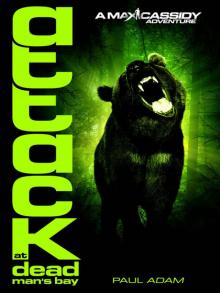 Attack at Dead Man's Bay
Attack at Dead Man's Bay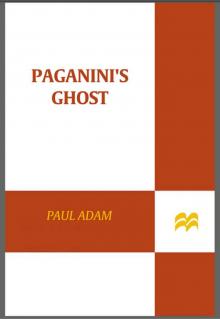 Paganini's Ghost
Paganini's Ghost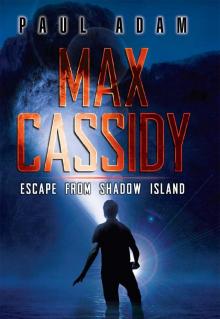 Escape from Shadow Island
Escape from Shadow Island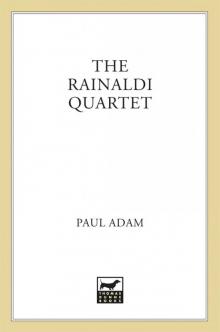 The Rainaldi Quartet
The Rainaldi Quartet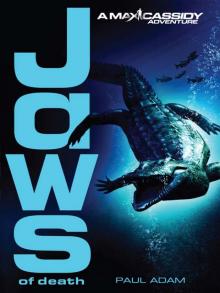 Jaws of Death
Jaws of Death